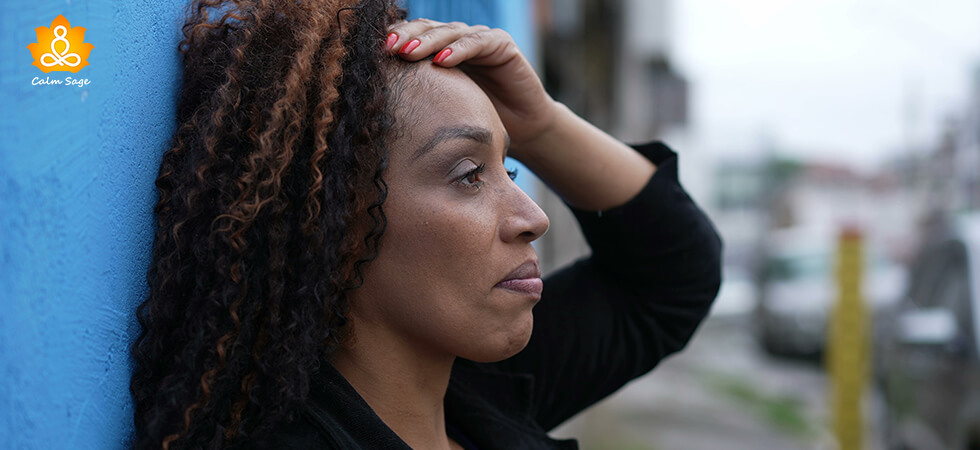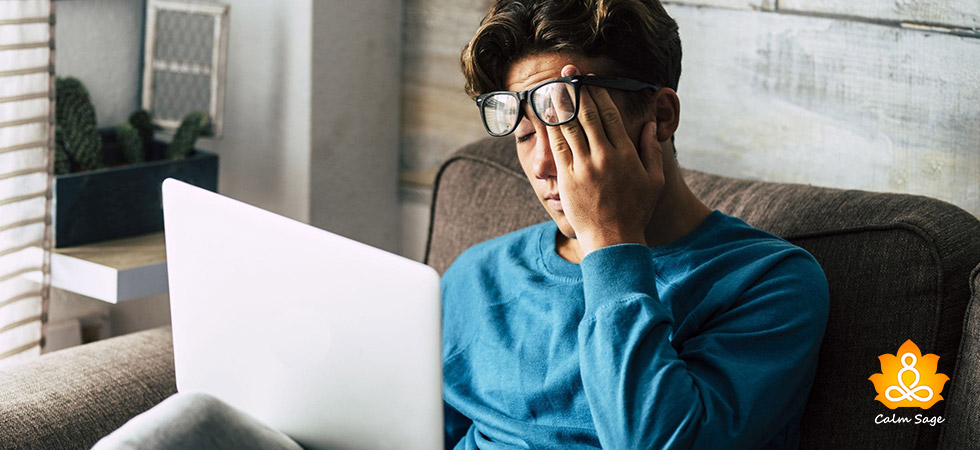Can Sensory Overload Cause Anxiety? Here’s How To Cope With It

Do you feel yourself becoming overstimulated and anxious in crowds or because of loud noises? Is discomfort a common occurrence when you think about situations that others probably feel normal? It could be sensory overload anxiety at play.
Making a trip to the grocery store is a normal activity yet if the mere thought of going out in public makes you feel frazzled or tensed (bordering on overstimulation) then it could be a combination of anxiety and sensory overload. Quite a distracting variety, isn’t it?
Many people find it no trouble to process sensory information but young children, older adults, and others can have sensory processing disorder or sensory overload disorder. This disorder can make it harder for some to process the information our senses receive regularly, making them sensitive to sensory processes such as sounds, sights, flavors, smells, etc.
Anxiety thus becomes a common experience in people who get easily overstimulated and are sensitive to sensory processing. Below, let’s take a look at the relationship between sensory overload and anxiety.
What Does Sensory Overload Look Like?
Sensory overload is a term that can indicate overstimulation when one or more of the senses become overwhelmed. Sensory overload can make it difficult to focus on one thing at a time. No one who experiences sensory overload needs to have a sensory overload disorder or any similar disorder.
Anyone can experience sensory overload, however, here are some conditions that can be connected to sensory overload;
- Sensory Processing Sensitivity: Here, people have a heightened awareness and can be called hypersensitive.
- Sensory Overload Disorder: Here, people have either a high or low sensory input than normal.
- Autism Spectrum Disorder
- Attention Deficit Hyperactivity Disorder (ADHD)
- Post-Traumatic Stress Disorder (PTSD): Some traumatic experiences can make people sensitive to their surroundings, especially the ones that might be related to or trigger their trauma response.
- Anxiety Disorders
Sensory overload can be triggered by;
- Too bright lights or a messy environment
- Uncomfortably tight or itchy clothes
- Sudden loud noises
- Strong scents such as chemical products or perfume
- Strong and flavorful dishes
- Temperatures
If you experience sensory overload, then it can look like;
- Feeling too overwhelmed that results in a complete shutdown or an emotional meltdown
- Experiencing unexplained irritation or rage
- Experiencing tension in your muscles
- Having too many or no thoughts
- Experiencing exhaustion
- Experiencing dissociation
Sensory Overload And Anxiety Disorders
Sensory overload and anxiety disorders can be related, especially if we talk about panic disorder. Panic disorder causes panic attacks that happen when you’re faced with a sense of fear. This response can make it difficult to breathe and cause dizziness. A sensory overload can cause a panic attack.
However, living with an anxiety disorder does not mean that you’re prone to sensory overload or overstimulation. Even then, many people with sensory processing disorders and anxiety report having a high sensitivity instead of anxiety as their source of problems.
Studies suggest that if you have sensory processing problems then you can be more likely to have an anxiety disorder.
While there are different types of anxiety disorders, the symptoms of many are common. Sensory overload has aftereffects that might look similar to anxiety.
The symptoms of sensory overload anxiety can include;
- Racing thoughts
- Restlessness
- Fatigue
- Muscle tension
- Nausea or IBS
- Dissociation
- Irritability
- Brain fog
- A strong need to get away from the sensory trigger
- A strong reaction to physical sensations
How Can You Manage Sensory Overload Anxiety?
When you struggle with sensory overload anxiety, you may need to handle the condition a little differently than you would either sensory overload or anxiety. Here’s what you can do to treat and cope with sensory overload anxiety;
1. Identify And Reduce Triggers
The first thing you need to do is identify and manage your triggers to avoid getting overstimulated easily. I’m not asking you to reduce your important tasks, I’m suggesting you make your environment less sensitive. You can try:
- Making your home a scent-free environment
- Keeping mess under control
- Wearing loose and comfortable clothing
- Using gentle and warm lighting
If you’re prone to overstimulation at work, then try to choose a safe work environment or choose to work from home. You can also use noise-canceling headphones or sunglasses when you leave the house to avoid overstimulation.
2. Try Self-Soothing
Self-soothing techniques can also help you cope with sensory overload anxiety. When you struggle with sensory overload anxiety, try;
- Meditating
- Deep breathing exercises
- Aromatherapy (if you’re not sensitive to smells)
- Yoga
- Listening to soothing instrumental music
3. Manage Emotional Response
Overstimulation in adults can cause physical and emotional distress, and it can become harder to manage those emotions.
You can try to regulate your emotional response by;
- Identifying and accepting emotions
- Labeling your emotions
- Learning how to respond to those emotions
- Tolerating stressful situations until you feel safe
- Processing emotions quickly and effectively
Bottom Line
Experiencing overstimulation and sensory overload is OK. Being prone to sensory overload might make you sensitive to overstimulation, but it does not mean that it makes you prone to anxiety. However, sensory processing disorder might come with anxiety disorders.
Many symptoms can be common between sensory overload and anxiety. You can learn to overcome and cope with sensory overload anxiety with the right help and strategies as mentioned in this article.
Hypersensitivity to sensory processing is OK and can be manageable. However, if you’re still facing trouble managing sensory overload anxiety, don’t hesitate to reach out to a professional.
For more, you can write to us at info@calmsage.com or DM us on social media. You can also share your tips and thoughts in the comments section below.
Take Care!




















